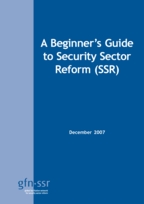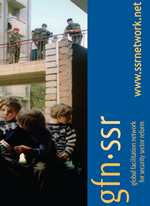
-
Report on the Security Sector in Latin America and the Caribbean
-
Useful links for organistaions working in the South American SSR field
-
GFN-SSR Document Library
Report on the Security Sector in Latin America and the Caribbean
This report published by FLACSO aims to contribute to the understanding of security sector related political and institutional processes in the region since the return to democracy. The development of a systematic vision of multiple institutions linked to the sector is one of the remaining tasks in the process of democratic consolidation in the region. Advances in this area have been uneven on both a thematic and territorial level. For example, the armed forces were heavily analysed during the 1990s in Central America and the Southern Cone, where they played active roles during the civil wars and dictatorships. Similarly, police institutions were the focus of important changes after the signing of Central American peace agreements. However, in most of the countries in the region, reform and research initiatives relating to the armed forces, police and intelligence services are still very limited. This is particularly true of the intelligence sector – progress is still much less evident and, in many instances, reform processes have not yet begun. The consolidation of democracy in Latin America and the Caribbean requires security services that function within a constitutional framework, respecting human rights and the decisions of the ruling government. Within a context of high levels of public insecurity, it is necessary to professionalise the institutions affiliated with the security sector. The development of comparative studies will permit the recognition of political and institutional processes underway, thereby allowing for the identification of weaknesses and the necessary conditions for an agenda to strengthen civilian and democratic management of the sector.
- Please click here to download the full report.
- The English version of the report was officially launched in the UK by GFN-SSR in London on 2 July. For a report on the launch event and subsequent discussion, please click here.
- GFN-SSR will also be publishing a Topic Guide on SSR in Latin America later this year.
Useful links for organistaions working in the South American SSR field
-
Red de Seguridad y Defensa de America Latina (RESDAL)
[Latin American Network for Security and Defence] -
Centro de Estudios de Justicia de Las Americas (CEJA)
[Justice Studies Centre of the Americas (JSCA)]- Reports on the Justice Sector 2006-2007
These reports, published by the Justice Studies Centre of the Americas (CEJA), provide an excellent overview of the justice sectors in every country in Latin America and the Caribbean. Each report describes the organisation of the individual country’s justice system before going into greater detail to cover legal and penal codes, the power of the judiciary, the police and justice reform projects currently underway, among other topics.- in English
- in Spanish
- Reports on the Justice Sector 2006-2007
- Facultad Latinoamericana de Ciencias Sociales (FLACSO)
[Latin American Faculty of Social Sciences] - Comunidad Segura
[Safe Communities] - Instituto Latinoamericano de Seguridad y Democracia (ILSED)
[Latin American Institute for Security and Democracy] -
Fundación Ideas para la Paz (FIP)
[Ideas for Peace Foundation] -
Fundación Seguridad y Democracia
[Security and Democracy Foundation] - Universidad de Los Andes, Grupo de Estudios de Seguridad y Defensa (GESED)
[Universidad de Los Andes, Defence and Security Studies Group] - Instituto de estudios estratégicos (ARCIS)
[Institute for Strategic Studies] -
Instituto de Defensa Legal (IDL)
[Institute for Legal Defence] - Viva Rio
-
Instituto Sou da Paz
[Institute of Peace] - UNDP – Latin America and Caribbean Sub-Regional Resource Facility (LAC SURF)
-
Agencia Latinoamericana de Información (ALAI)
[Latin American Information Agency] - Observatorio de Democracia y Seguridad
[Centre for Democracy and Security]
GFN-SSR Document Library
The Document Library contains links to a number of SSR related documents either focussing specifically on SSR in South America or looking at the continent or countries within the continent alongside others as case studies. A selection of these are listed below:
- Justice as Prevention: Vetting Public Employees in Transitional Societies
Vetting public employees in transitional societies has received less research attention than prosecutions, truth telling and reparations of individuals who have perpetrated human rights abuses under authoritarian regimes or in conflicts. This paper reports results of case studies in countries that have conducted post-conflict/post-authoritarian vetting of public servants. Vetting is more than technical personnel reform; it can help institute new norms for service in public institutions. - The Way Back In: Reintegrating Illegal Armed Groups in Colombia Then and Now
Which factors determine whether former combatants can be successfully integrated into social and political spheres at the end of a conflict? This article published in Conflict, Security and Development compares the political reintegration of the Movimiento 19 de Abril (M-19) in Colombia in the early 1990s with the reintegration of the paramilitary a decade later. It argues that successful reintegration depends on the acceptance of relevant audiences and the capacity of former combatants to perform as social and political interlocutors. - Maiming the People: Guerrilla Use of Antipersonnel Landmines and Other Indiscriminate Weapons in Colombia
Casualties from antipersonnel landmines in Colombia have increased dramatically in recent years. The use of antipersonnel landmines by the Revolutionary Armed Forces of Colombia (FARC-EP) and the National Liberation Army (ELN) kills and injures hundreds of civilians every year. This report from Human Rights Watch documents the impact on civilian victims of antipersonnel landmines and the assistance the government provides to survivors. - Dealing with the Past in Post-Conflict Societies: Ten Years after the Peace Accords in Guatemala and Bosnia-Herzegovina
Dealing with a legacy of human rights violations is one of the most difficult challenges facing any society in the aftermath of violent conflict. The Swisspeace Annual Conference 2006 considered the cases of Guatamala and Bosnia-Herzegovina, the peace agreements that ended the conflicts in these countries a decade after they were signed and a number of related issues. The introductory article from the conference outlines the factors that lead to establishing truth commissions in one context and judicial tribunals in another, considering how a society can learn to live with the memory of human rights violations, and how external actors can contribute to the process of reconciliation. - The Gender Dimensions of Post-Conflict Reconstruction: The World Bank Track Record
To what extent has the World Bank incorporated gender considerations into its investments in post-conflict reconstruction (PCR) situations? This paper from Gender Action examines World Bank PCR investments for gender considerations, with particular attention to Angola, Cambodia, Colombia, Iraq, Sri Lanka and Rwanda. It shows that the World Bank has integrated gender considerations into its investments to only a limited extent. The Bank must integrate into PCR: 1) women-focused activities; 2) gender aware programming; and 3) the promotion of gender equality aimed at building peaceful societies. - Towards Global Standards: Regional Experience in Small Arms Transfer Controls
What lessons do regional experiences in small arms transfer controls provide for the construction of universal principles for the authorisation of small arms transfers? This publication from Project Ploughshares presents papers from an international seminar on ‘Regional Dimensions of Global Small Arms and Light Weapons Transfer Principles’. It shows that there is a growing global consensus, derived from international law, on the key principles that should govern arms transfers. The emerging challenge for the international community is to ensure coherence among initiatives addressing small arms transfer and initiatives addressing transfer of all conventional weapons. - Building effective states: Taking a citizen’s perspective
How can a citizen-centred approach to development build effective states by improving relations between state and society? This paper from the Development Research Centre on Citizenship, Participation and Accountability, gives an overview of current debates and analyses citizens’ own views on these issues. It argues that a state’s legitimacy is strengthened by civic participation, which often grows up around local issues, and can be empowered through donor support. - Non-state Justice and Security Systems: A Guidance Note
Non-state justice and security (NSJS) systems deal with the majority of disputes in developing countries and are an important complement to formal state justice. What is the best way for donors and governments to engage with them? What are the policy options that increase security and justice for the poor and marginalised? This study from the Department for International Development explores this issue drawing on examples from Africa, Asia and Latin America.









